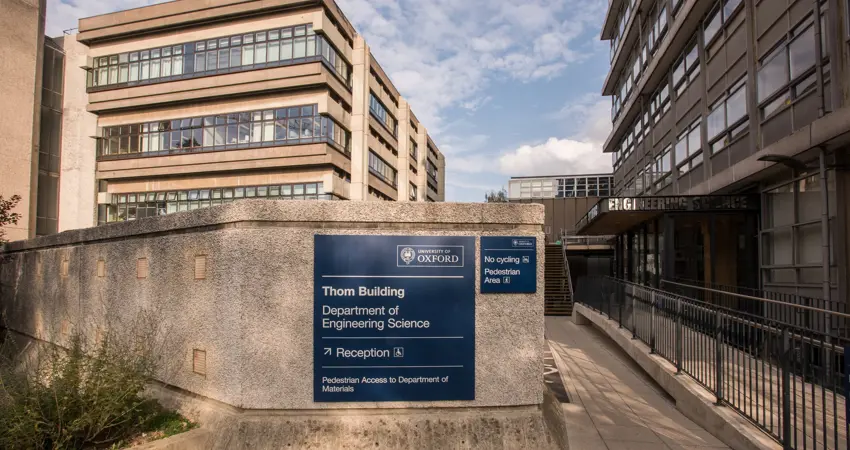25 Sep 2023
New academics at the Department of Engineering Science at Oxford
The Department extends a warm welcome to our newest Faculty members and Departmental Lecturers

The Department extends a warm welcome to our newest Faculty members and Departmental Lecturers:
Liang He, Associate Professor in AI for Sports Medicine (in association with a Non-Tutorial Fellowship at Kellogg College)
Emilio Martínez-Pañeda – Associate Professor in Civil Engineering (in association with Non-Tutorial Fellowship at Harris Manchester).
Reece Oosterbeek – Associate Professor in Mechanical Engineering (in association with Tutorial Fellowship at Lincoln College).
Yangchen Pan, Departmental Lecturer in Machine Learning
Jack Umenberger, Departmental Lecturer in the Control Group
Mauricio Villarroel, Associate Professor in Youth Sports Medicine Technology (in association with a Non-Tutorial Fellowship at Magdalen College)
Tingting Zhu, Associate Professor in AI for Digital Health, Non-Tutorial Fellow at Kellogg College and Stipendiary College Lecturer at Mansfield College
Emilio Martínez-Pañeda is Associate Professor of Civil Engineering. Emilio joins us from Imperial College London where he led an interdisciplinary research group from 2019 to 2023 (2019: Lecturer, 2021: Senior Lecturer, 2023: Reader). Before joining Imperial, he was an 1851 Research Fellow at the University of Cambridge. Emilio’s research spans a wide range of challenges lying at the interface between mechanics and other disciplines, such as materials science, geology, chemistry, biology, and structural engineering. He combines experiments, theory and computer simulations to develop mechanistic models that can reliably capture material deformation and fracture. Emilio’s efforts have been supported by various funding schemes (ERC Starting Grant, UKRI Future Leaders Fellowship, EPSRC, Innovate UK) and recognised through multiple awards, awards including the 2021 UK Young Engineer of the Year (Royal Academy of Engineering), the 2022 Imperial College President’s Medal for Excellence in Research (Early Career), the 2021 Gustavo Colonnetti Medal (RILEM), the 2020 IMechE Prestige Award, the 2020 Simo Prize (SEMNI), and the 2023 Young Investigator Medal by Spain’s Royal Academy of Engineering.
Liang He is an Associate Professor of Biomedical Engineering (AI for sports medicine). His research focuses on soft robotics, biosensors, haptic and VR, and wearable robotics. In particular, he is interested in exploring embodied-AI solutions for healthcare and biomedical applications. He obtained his PhD at Imperial College London with a focus on medical robotics (2017-2020). During the period, he has been a key researcher in the EPSRC Motion and RoboPatient projects, where he develops virtual simulators and wearables for medical training. In early 2021, he joined the Oxford Robotics Institute with the Embodied Intelligence Program to develop soft-sensing skin for robots working with humans. In 2022, he was elected co-chair of the Research Staff Forum at the MPLS Division and appointed as a member of the Research Staff Consultation Group at Oxford. He was also awarded an MPLS Enterprise and Innovation Fellowship and an Ideas2Impact Fellowship from the Saïd Business School.
Reece Oosterbeek is an Associate Professor of Engineering Science, and a member of the Solid Mechanics and Materials Engineering Group. His research focuses on developing new materials for medical implants, utilising approaches such as novel mechanical metamaterials and bioresorbable composites. Reece obtained BE(Hons) and ME degrees in Chemical and Materials Engineering from the University of Auckland, followed by a PhD in Materials Science and Metallurgy (2020) from the University of Cambridge. In Cambridge Reece's doctoral work, funded by a Woolf Fisher Scholarship, focused on bioresorbable polymer-glass composites for medical implants. Following this he moved to Imperial College London for post-doctoral research, where he began working on additively manufactured metal lattice materials for orthopaedic implants in the Biomechanics Group. In 2022 he joined the department as a Departmental Lecturer, before being appointed to his current role in 2023, where he is developing new mechanical metamaterials and bioresorbable materials for advanced medical implants.
Professor Tingting Zhu graduated with a DPhil degree in information and biomedical engineering at Oxford University in 2016. This followed her MSc in Biomedical Engineering at University College London and BEng (Hons) in Electrical Engineering from the University of Malta. After DPhil, Tingting was awarded a Stipendiary Junior Research Fellowship at St. Hilda's College, Oxford. In 2018, Tingting was appointed as the first Associate Member of Faculty at the Department of Engineering Science; in 2019, following the award of her Royal Academy of Engineering Research Fellowship, she was appointed full Member of Faculty. Tingting has extensive experience in analysing data collected from sensors or devices and electronic health records, as well as creating tools to provide cost-effective diagnosis and prediction of patient’s health status, with the aim to provide decision support for prioritising resources needed for bettering patient outcomes. Tingting’s research includes developing novel machine-learning methodologies for improving patient health in a global setting, such as creating digital twin models for phenotyping complex diseases, diagnosis and prognosis of adversarial events, and treatment monitoring and recommendation, with a focus on individuals with multiple long-term conditions including chronic diseases and cancer.
For all bios please see the links above




